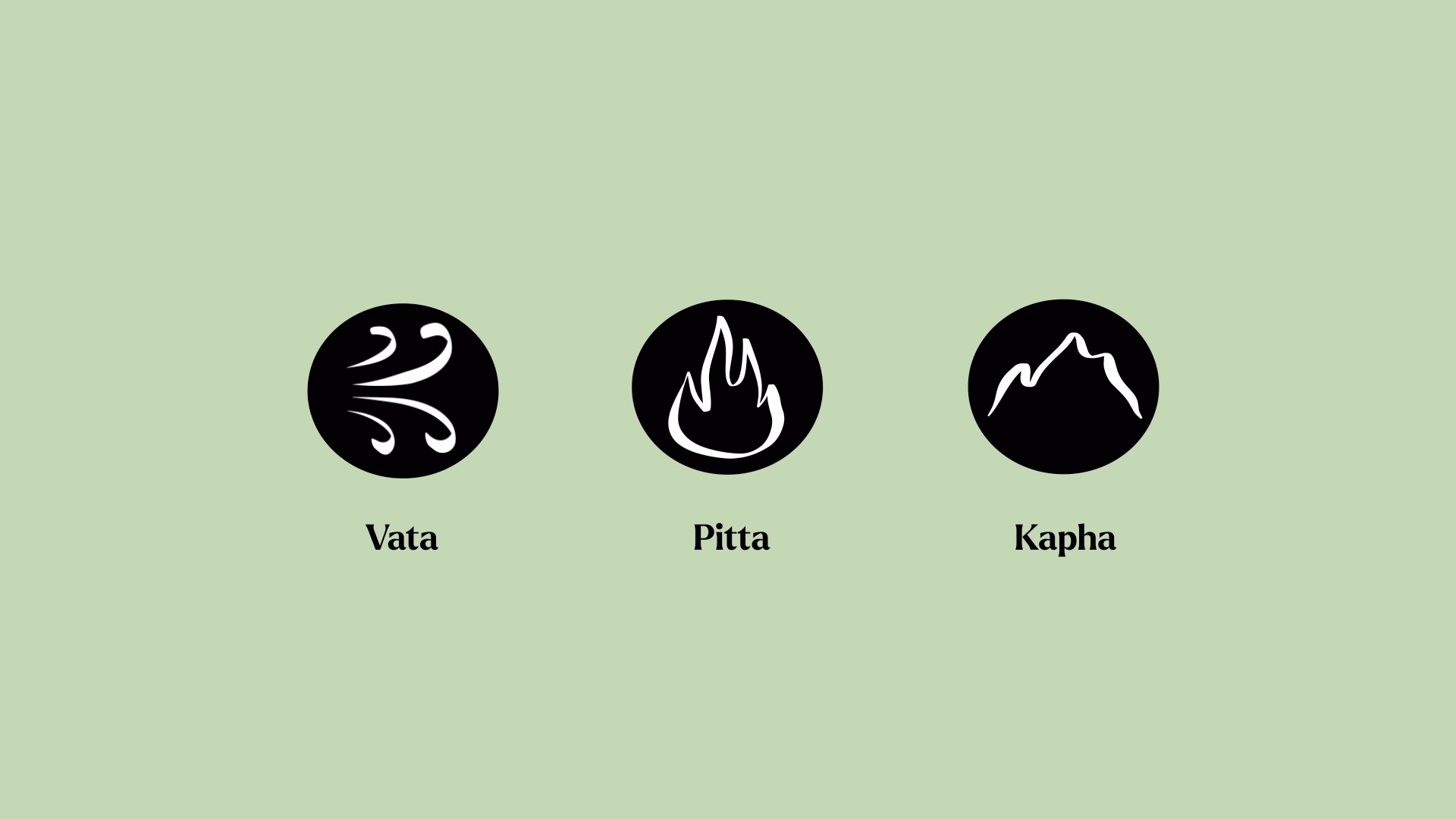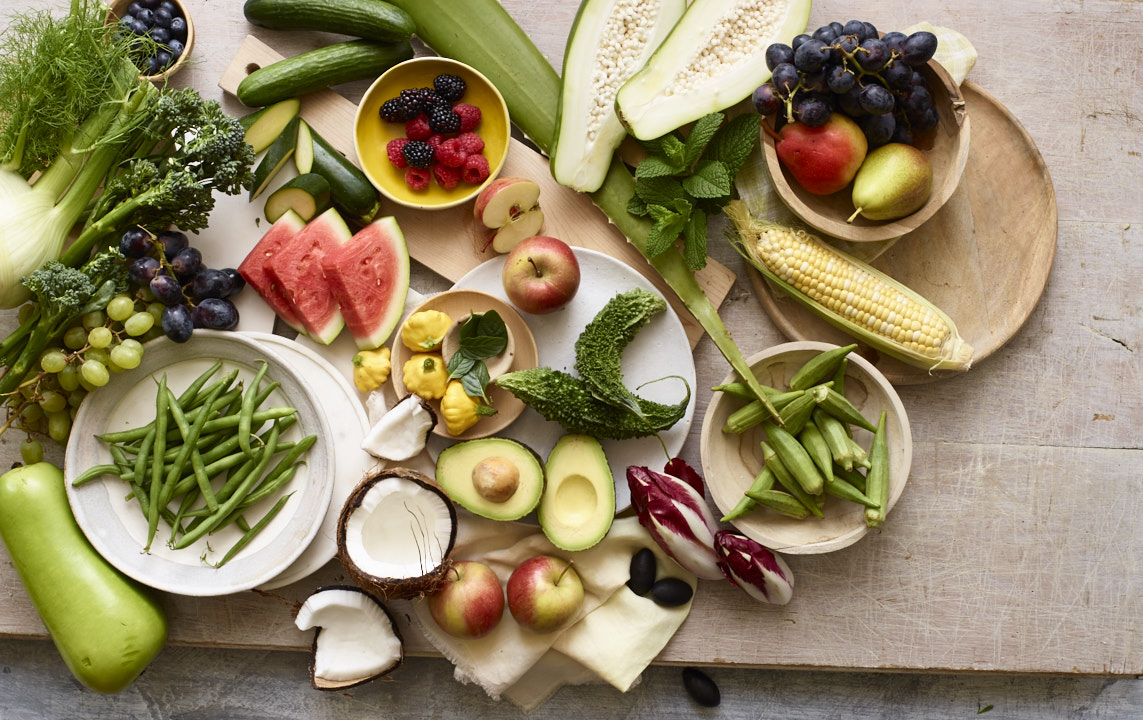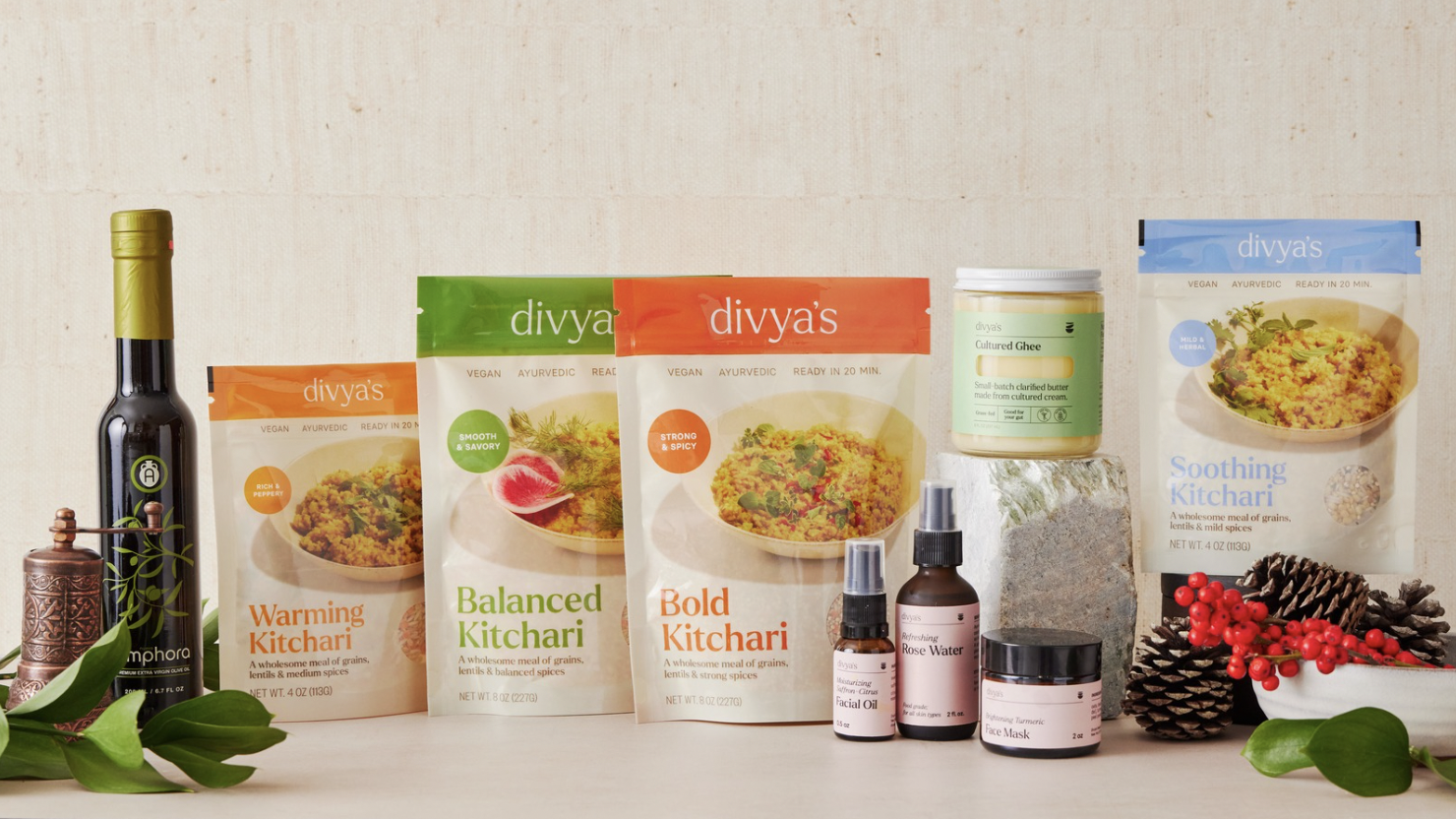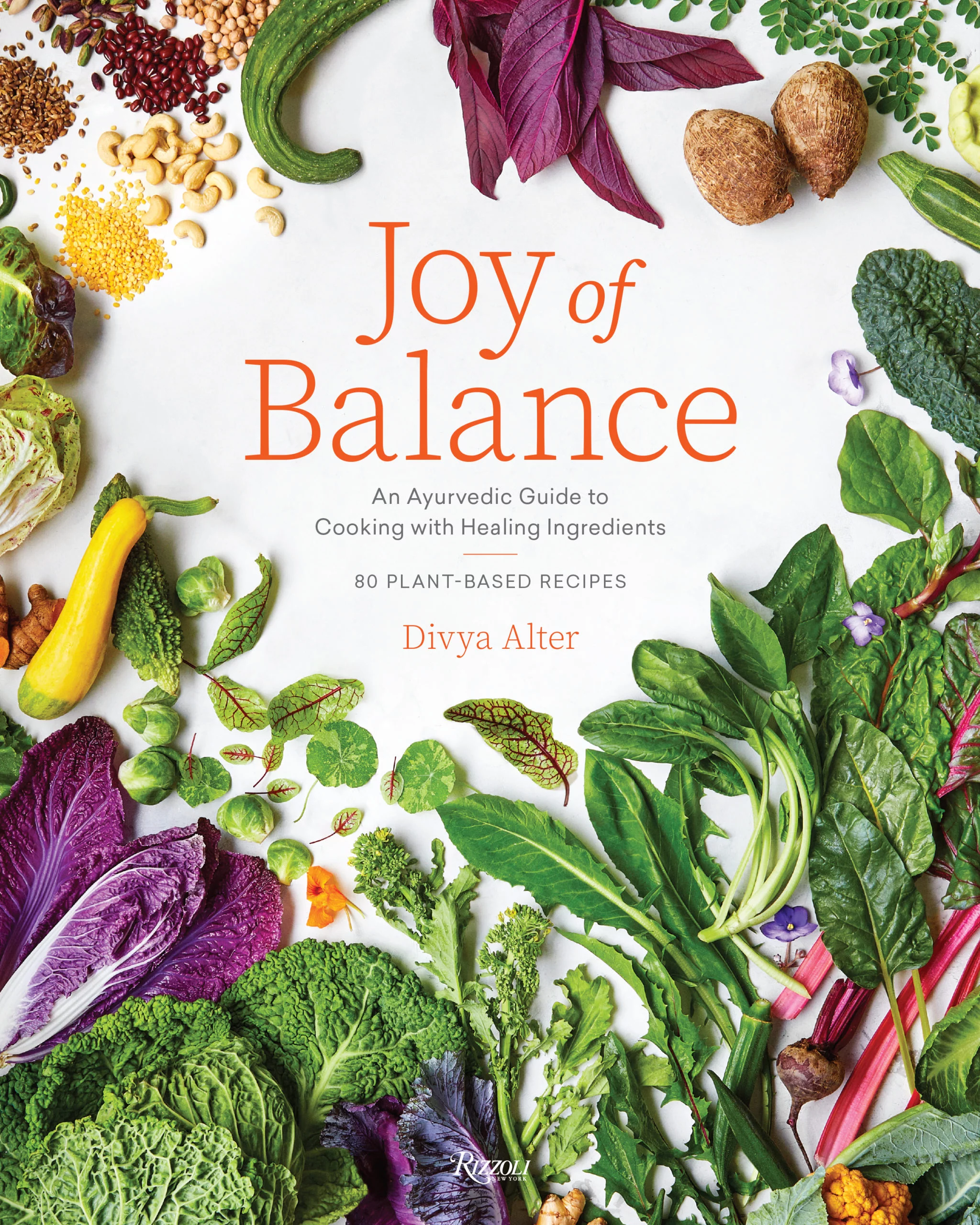Doshas Demystified
Oct 14thIn this article, Divya demystifies the Ayurvedic concept of doshas. She explains that doshas help us understand our unique constitution, our present health imbalances and the foods we need to restore balance.
- SHARE:

What are Doshas?
Adapted from Joy of Balance by Divya Alter (Rizzoli, 2022)
According to Ayurveda, everything on earth is made up of five elemental energies or states of matter (commonly known as the five elements):
Earth: The state of solidity and stability
Water: The state of fluidity, moisture and flow
Fire: The state of heat and transformation; that which engulfs whatever it comes into contact with
Air: The state of mobility and movement
Ether: The space or the field that contains the above four elements
These five states of matter express themselves in the human body as the three doshas: Vata, Pitta and Kapha.
Vata: Ether and Air
Pitta: Fire and Water
Kapha: Water and Earth
The doshas are universal energies that come into contact with the body. They are the functions at play in human physiology. Because the body constantly fluctuates, each dosha fluctuates. Anytime we do something in excess, the doshas become aggravated and the body is subjected to pathology or disease.
Each Dosha Explained
Vata dosha is the harmonious union of ether and air, and it takes on the qualities of these two elements in the body: dry, light, cold, rough, subtle and mobile. Vata is the circulatory energy that governs the body- mind functions of movement, the nervous system, speech, breathing, elimination, sense of touch, creativity and our innate healing intelligence; it also coordinates the movements of Pitta and Kapha.
Pitta dosha is the body’s expression of the fire element protected by a smaller amount of fluidity (water element) and takes on their qualities: slightly oily (think of gasoline), penetrating, hot, light, slightly foul smelling and spreading easily. Pitta is the “cooking energy” that governs transformation (all chemical and metabolic functions), digestion, body warmth, visual and mental perception, appetite and thirst; it powers the intellect, luster, complexion and courage.
Kapha dosha is the combination of the elements water and earth. When you mix them together, they turn into mud, and the Kapha qualities are very similar to those of mud: oily, cool, heavy, slow moving, moist and stable. Kapha is the cohesive “glue energy” that provides structure, support and static stability and makes up the bulk of bodily tissues. It maintains the functions of growth and provides nourishment and lubrication to the organs, tissues, joints and mucus membranes; it gives physical endurance and strength to the heart, lungs, brain and other organs.
Vata activates when there is a need for something to move.
Pitta activates when there is a need for something to transform.
Kapha activates when there is a need for something to grow, lubricate or be “cushioned” with protection.
Your Unique Constitution
All three doshas are present in everyone, but they express themselves in a unique way in each one of us. The distinctive combination of the doshas at our time of birth defines our constitution or natural disposition (prakriti). Most people have a predominance of one or two doshas, and some people have an equal amount of the three (tridoshic).
The dominant dosha(s) will be reflected in your self-expression: in the way you look, think and operate in life. And that dominant dosha is usually the first one to go out of its optimal state when you’re under stress.
The body is the landscape where the doshas interact to create either vitality or disease. You experience vitality when you are closest to your unique constitution and disease when you are furthest from it, a sign that your doshas are functioning abnormally.
- Too much Vata will create unnatural dryness, coldness, circulation and elimination issues, depletion, anxiety, fear, dissatisfaction or insecurity.
- The overflow of Pitta will lead to excess heat, burning sensations, inflammation, impatience, impulsiveness or anger.
- Excess Kapha will increase the feelings of heaviness, sluggishness, accumulation, inertia, lack of confidence or sadness.
Your Doshas In Action
The doshas are bioenergies—we can’t measure them with modern scientific tools. However, we can perceive them, just like we can perceive the mind’s movements. And like all energy, the three doshas constantly fluctuate and “dance”—they are never static. Vata goes high when we’re exercising, Pitta goes high when we’re hungry, Kapha goes high when we’re sleeping. However, in a healthy person, the heightened doshas become alleviated very quickly. In a diseased person, they accumulate, aggravate and then displace themselves—this is when we begin to feel unwell.
It Is important to understand what your constitution, or metabolic type, is because it is your original blueprint for perfect health, and it guides you to proactively and continually maintain a healthy lifestyle.
It is even more important to know how stress causes your current dosha dysfunction, the cause of your illness or your feeling of being unwell. That dysfunction is what you need to correct to bring yourself back to your perfect health. Like it or not, for as long as you have a body and mind, you’ve got to deal with your doshas!
I love the concept of the doshas because it explains why we’re all different and why we all have different needs. Knowing my constitution helps me align with my unique nature, better understand myself and my tendencies and find my reference point for perfect health. This Ayurvedic concept also enables me to do the same with others, thus allowing me to feel more compassion. It reduces my judgmental habit of comparing myself to others and thinking that others should be like me. Now it is easier for me to discern when someone’s self-expression stems from harmony as a call of love, or from imbalance as a cry for love, and from there, I look for a kind way to connect with that person.
Turning Knowledge Into Power
You can use the concept of the doshas to learn so much about yourself: how your organism operates; identify its strengths and weaknesses; build true vitality for your own unique body; and provide real contentment for your own unique mind. Thus, you will lay a healthy terrain for accelerating your spiritual growth, which is the ultimate purpose of Ayurveda.
Want to know the fastest way to manage your doshas? Choose the right foods.
And in my digital masterclasses, you’ll learn how to do exactly that. Featuring over 8 hours of guided video content along with interactive workbooks, these courses will teach you:
- How to determine your unique personal doshas
- How to recognize which doshas are out of balance and why
- How to choose the right foods to bring yourself back into balance
- And much, much more!
Click here to learn more about the masterclasses.
Looking for even more guidance? In my newest cookbook, Joy of Balance, I explain the effect that each featured ingredient or recipe has on the doshas. You can also refer to my first cookbook, What to Eat for How You Feel, where I elaborate on how the three doshas express themselves in their balanced or imbalanced states—an invaluable tool if you’re feeling out of balance but you’re not sure which dosha is involved.
More Articles

Are Raw Foods Good For You?
Here at Divya’s, we’re often asked about Ayurveda’s perspective on raw foods. In this article, we talk about the pros and cons of eating raw dishes and snacks, how to enjoy them safely and when to avoid them altogether.

Why Mindful Eating Matters
When was the last time you ate quietly, chewing slowly and truly savoring your food? In this article, Divya covers the importance of mindful eating and why poor eating habits can negatively affect your health.

5 Ayurvedic Tips for Air Travel
Ayurvedic guidelines for staying healthy and balanced before, during and after traveling by plane.







